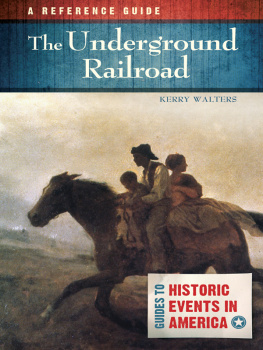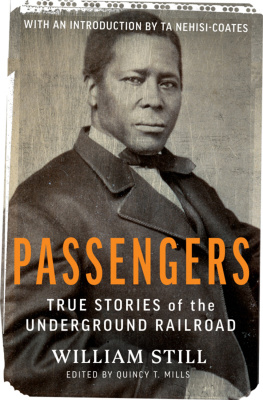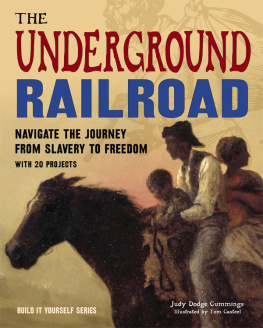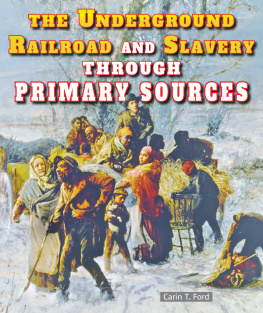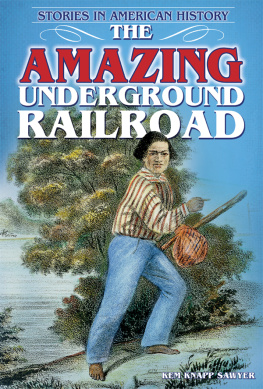About the Author
KERRY WALTERS is the William Bittinger Professor of Philosophy and Professor of Peace and Justice Studies at Gettysburg College (PA), near the site of the historic Civil War battle. Walters is the author or editor of more than 20 books, including Benjamin Franklin and His Gods, Revolutionary Deists: Early America's Rational Infidels, and a critical edition of Thomas Paine's The Age of Reason.
Appendix: Primary Documents of the Underground Railroad
Fugitive Slave Clause, Northwest Ordinance (1787)
Enacted by the Continental Congress, the Northwest Ordinance established land north of the Ohio and east of the Mississippi rivers as official U.S. territory. The land was ceded by the British after the War of Independence. The ordinance forbade slavery in the Northwest Territory but permitted rendering fugitive slaves to their owners.
Article VI. There shall be neither slavery nor involuntary servitude in the said Territory, otherwise than in the punishment of crimes, whereof the party shall have been duly convicted; provided, always, that any person escaping into the same, from whom labor or service is lawfully claimed in any one of the original States, such fugitive may be lawfully reclaimed and conveyed to the person claiming his or her labor or service aforesaid. Approved 13 July 1787.
Source: Supplement to the First Volume of the Columbian Magazine (Philadelphia, 1787), 855.
Fugitive Slave Clause, U.S. Constitution (1787)
Submitted by South Carolina's two delegates to the Constitutional Convention, this clause extended Article VI of the Northwest Ordinance to the 13 and all future states. The two documents made all activities of the future Underground Railroad de facto illegal. The Fugitive Slave Clause was superseded by the Thirteenth Amendment, ratified in 1865.
Article IV, Section 2. No person held to service or labor in one State, under the laws thereof, escaping into another, shall, in consequence of any law or regulation therein, be discharged from such service or labor, but shall be delivered up on claim of the party to whom such service or labor may be due. Approved 13 September 1787.
Source: National Archives (http://www.archives.gov/exhibits/charters/constitution_transcript.html)
Fugitive Slave Act of 1793
Both the Northwest Ordinance and the U.S. Constitution mandated the return of runaway slaves to their masters. But neither document prescribed the means for doing so. The Fugitive Slave Act of 1793 attempted to fill that gap.
An Act respecting fugitives from justice, and persons escaping from the service of their masters.
Be it enacted, That, whenever the Executive authority of any State in the Union, or of either of the Territories Northwest or South of the river Ohio, shall demand any person as a fugitive from justice, of the Executive authority of any such State or Territory to which such person shall have fled, and shall moreover produce the copy of an indictment found, or an affidavit made before a magistrate of any State or Territory as aforesaid, charging the person so demanded with having committed treason, felony, or other crime, certified as authentic by the Governor or Chief Magistrate of the State or Territory from whence the person so charged fled, it shall be the duty of the executive authority of the State or Territory to which such person shall have fled, to cause his or her arrest to be given to the Executive authority making such demand, or to the agent when he shall appear.
Section 2. And be it further enacted, That any agent appointed as aforesaid, who shall receive the fugitive into his custody, shall be empowered to transport him or her to the State or Territory from which he or she shall have fled. And if any person or persons shall, by force, set at liberty, or rescue the fugitive from such agent while transporting, as aforesaid, the person or persons so offending shall, on conviction, be fined not exceeding five hundred dollars, and be imprisoned not exceeding one year.
Section 3. And be it also enacted, That when a person held to labourshall escape into any other part of the said States or Territory, the person to whom such labor or service may be due, his agent or attorney, is hereby empowered to seize or arrest such fugitive from labor, and to take him or her before any Judge of the Circuit or District Courts of the United States, residing or being within the State, or before any magistrate of a county, city, or town corporate, wherein such seizure or arrest shall be made, and upon proof to the satisfaction of such Judge or magistrate, either by oral testimony or affidavit taken before and certified by a magistrate of any such State or Territory, that the person so seized or arrested, doth, under the laws of the State or Territory from which he or she fled, owe service or labor to the person claiming him or her, it shall be the duty of such Judge or magistrate to give a certificate thereof to such claimant, his agent, or attorney, which shall be sufficient warrant for removing the said fugitive from labor to the State or Territory from which he or she fled.
Section 4. And be it further enacted, That any person who shall knowingly and willingly obstruct or hinder such claimant, his agent, or attorney, in so seizing or arresting such fugitive from labor, or shall rescue such fugitive from such claimant, his agent or attorney, when so arrested pursuant to the authority herein given and declared; or shall harbor or conceal such person after notice that he or she was a fugitive from labor, as aforesaid, shall, for either of the said offences, forfeit and pay the sum of five hundred dollars. Which penalty may be recovered by and for the benefit of such claimant, by action of debt, in any Court proper to try the same, saving moreover to the person claiming such labor or service his right of action for or on account of the said injuries, or either of them. Approved, February 12, 1793.
Source: Annals of Congress, 2nd Congress, 2nd Session (November 5, 1792 to March 2, 1793), in Proceedings and Debates of the House of Representatives of the United States at the Second Session of the Second Congress, Begun at the City of Philadelphia, November 5, 1791, pp. 141415.
Fugitive Slave Act of 1850
States opposed to slavery ignored or undermined the Fugitive Slave Act of 1793. Many of them passed Personal Liberty laws to protect fugitives, forbade local officials to cooperate with federal authorities in the pursuit of runaways, and turned a blind eye to Underground Railroad rescues. Under pressure from angry slaveholders, Congress passed a new Act in 1850 that incorporated the first one's provisions and added harsh penalties for noncompliance.
Section 5. And be it further enacted, That it shall be the duty of all marshals and deputy marshals to obey and execute all warrants and precepts issued under the provisions of this act, when to them directed; and should any marshal or deputy marshal refuse to receive such warrant, or other process, when tendered, or to use all proper means diligently to execute the same, he shall, on conviction thereof, be fined in the sum of one thousand dollars, to the use of such claimant; and after arrest of such fugitive, by such marshal or his deputy, or whilst at any time in his custody under the provisions of this act, should such fugitive escape, whether with or without the assent of such marshal or his deputy, such marshal shall be liable, on his official bond, to be prosecuted for the benefit of such claimant, for the full value of the service or labor of said fugitive: and the better to enable the said commissioners, when thus appointed, to execute their duties faithfully and efficiently,they are hereby authorized and empoweredto summon and call to their aid the bystanders, or
Next page
